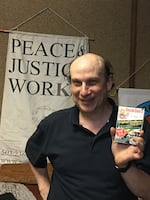
An undated photo of Dan Handelman, a prominent activist in Portland who died earlier this month.
Courtesy of Matt Handelman
For decades, Dan Handelman spent his Friday nights on the southwest corner of Portland’s Pioneer Courthouse Square. His weekly “rally for peace and justice,” which attracted a few dozen supporters, would range from critiques of U.S. military actions to calls for local police reform.
Often the rally would end with a short march around the block, where Handelman would yell “no war” as he carried a black-and-white sign reading “Justice” over his shoulder.
That pattern ended earlier this month, when Handelman died suddenly after experiencing a stroke. He was 60.
Friends and supporters gathered at the same spot last Friday to carry on the tradition and mourn Handelman, a longtime Portland activist known for his steadfast commitment to police accountability and civil rights for more than three decades.
“We can never replace Dan, but we will do all that we possibly can to continue to honor Dan,” said Matt LaVine, a racial justice advocate and consultant at the Center for Equity and Inclusion, speaking into a megaphone to a group of about 40 people shortly after 5 p.m.
Attendees carried photos of Handelman, his cat Butters, and signs reading “Dan = Good Trouble,” interspersed with signs stating “War is Terrorism” and “Stop Bombing Yemen.”
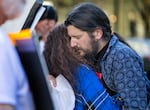
Charlie Michelle-Westley, left, embraces Matt LaVine during a memorial for Dan Handelman in downtown Portland, Ore., Apr. 18, 2025. Handelman, a prominent Portland police accountability and anti-war activist, died on April 9, 2025.
Anna Lueck for OPB
Some had known Handelman for decades. Others had never met him. But all shared concerns about how the sudden death of an indefatigable civic historian and activist creates a gaping hole in police accountability work in the region. Handelman was singular in his institutional knowledge of policing in Portland. No one’s sure how to fill the vacuum he leaves behind.
“It just feels like there’s an emptiness, a complete and total loss,” said Charlie Michelle-Westley, who attended Handelman’s weekly rallies for years. “I’m scared that it’s going to be a much longer journey toward police accountability without him.”
‘Peaceful’ boy, ‘serious student’
Handelman grew up in a civically minded household in Scarsdale, a suburb of New York City. His father was a lawyer who volunteered as the mayor of that town, and his mother worked as a journalist.
Handelman was the middle child of three brothers. Even as a kid, Matt Handelman said his older brother Dan could be described as “peaceful.”
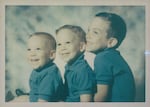
In this family photo circa 1967, Dan Handelman, center, with his brothers Matt, left, and David.
Courtesy of Matt Handelman
“He was sensitive, he was super compassionate,” said Matt Handelman. “But he was also very focused and intense. A serious student.”
Handelman studied theater and set design in college, a vocation that brought him to Portland in the early ’90s. It helped pay the bills as he spent more and more time immersed in national politics and U.S. military attacks overseas. What he learned deeply troubled him.
Matt Handelmen recalled seeing his brother in tears over the George H.W. Bush administration’s decision to bomb Baghdad in 1991.
“All he could think of was innocent people being killed,” Matt said.
The peace movement drew Handelman to activism.
At a 1991 Gulf War protest in Portland, a 26-year-old Handelman told an Oregonian reporter, “This is a pro-troop and anti-war rally. We want the troops safe, but we want them safe by bringing them back home.”

An undated family photo shows Dan Handelman, first from right, with a protest banner.
Courtesy of Matt Handelman
In the ’90s, Handelman regularly organized rallies against the U.S. invasion into Iraq and calling for nuclear disarmament.
Lily Mitchel first met Handelman at protests in 1991, where she said he was a constant force at every gathering.
“I remember Dan being a part of that from Day 1. He was one of the prime movers,” she said. “His commitment was unflinching.”
Feminist who opposed violence
It didn’t take long for Handelman to find similarities between the military work done overseas and actions of local law enforcement.
“He saw the connection between military violence and police violence,” said Barb Greene, who was Handelman’s partner for three decades. “In both cases, it’s power over [others] and people misusing that power.”
He organized lectures, potlucks and meetings on these issues through the volunteer-run nonprofit Peace and Justice Works, which he founded in 1992. It’s through this work he met Greene.
“I was kind of searching for some kind of fulfillment in life,” said Greene, who was working in the mortgage business in the early ’90s. She found that at a Peace and Justice Works fair, where she signed up to join a group that filmed local anti-war demonstrations and lectures.
She was drawn to Handelman’s witty sense of humor, intellect, and passion for peace. What sealed the deal was a “feminist” pin Handelman sometimes wore on his jacket. She said it was a word few men of her generation used.
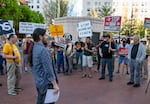
Matt LaVine speaks to the crowd during a memorial for Portland police accountability and anti-war activist Dan Handelman. Friends and supporters of Handelman gathered at the southwest corner of Pioneer Courthouse Square, where Handelman held rallies most Fridays, initially as a protest of the U.S.'s invasion of Iraq.
Anna Lueck for OPB
“And the fact that he did just kind of blew me away,” Greene said. “And that got my heart.”
Greene and Handelman worked closely over the years, pairing up to produce documentaries and film events. She edited every edition of the newsletter Handelman published through Portland Copwatch, another organization that emerged from Peace and Justice Works.
‘Tireless advocate’ with deep knowledge of policing
Handelman is best known for his work with Portland Copwatch.
Through Copwatch, Handelman vigilantly tracked police misconduct cases, wrongful death lawsuits against officers, and city policy changes to police bylaws — years before this information was easily accessible online. He brought his sharp analysis and critique of police oversight and policy to countless city police oversight committees, council hearings on police misconduct and the federal courts.
He closely followed the 2006 death of James Chasse, a man with schizophrenia who was killed when police tackled him hard enough to break 16 ribs and puncture a lung.
While the police involved were cleared from wrongdoing, outcry around his death — including advocacy from Handelman — led to the U.S. Department of Justice’s 2011 investigation of Portland Police Bureau’s disproportionate use of force against people with a mental illness. That investigation led to a drawn-out legal settlement between the city and the DOJ, which remains unresolved.
This commitment turned Handelman into an expert on the city’s police rules, policies, and litigation. When testifying at public meetings or chatting with other activists, Handelman would often refer to a police misconduct ruling or change in city code from decades ago, pointing to the exact year or name of an officer involved.
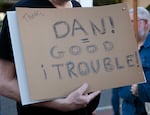
A sign reads "Dan = Good Trouble" during the memorial.
Anna Lueck for OPB
“It’s like he had an encyclopedic knowledge of all the things he’d been exposed to,” said Debbie Aiona, a longtime board member of the League of Women Voters of Portland who had worked alongside Handelman on police reforms since 2000.
Handelman was at the table in nearly every city conversation on policing in the past three decades.
In 2003, he railed against the inclusion of prosecutors on a police accountability board. In 2009, he opposed the city’s “sit-lie” proposal to ticket people for sitting on public sidewalks (an early version of the city’s current camping ban).
In 2010, he successfully pushed for the city to fire a police officer who fatally shot an unarmed man named Aaron Campbell. In 2016, he lobbied to change a city rule that gave police two days before having to be interviewed about using deadly force.
And year after year, he pushed back against the city’s involvement in the FBI’s joint terrorism task force.
This deep understanding of policing history in Portland also earned Handelman the respect of elected officials and police leadership — even if they were the target of Handelman’s critiques.
“There were times when I would agree with what he was saying, other times I wouldn’t,” said former City Commissioner Dan Saltzman. “But I always had the respect to listen closely to what Dan had to say, because I knew that whatever he had to say was based upon some careful analysis.”
Saltzman, who briefly oversaw the police bureau while in office, said Handelman’s work changed the city and its police force for the better.
In a statement emailed to OPB, Police Chief Bob Day called Handelman a “tireless advocate” who had immense knowledge about the police bureau.
Former city commissioner Jo Ann Hardesty met Handelman in the early 2000s. They both sat on a committee that suggested how to structure a new police oversight system under then-Mayor Vera Katz.
Hardesty said she and Handelman spent months researching a plan that was ultimately rejected by the city. Decades later, Hardesty saw an opportunity to revive the work they had done in a 2020 ballot measure to establish an independent police oversight board in Portland.
“It’s almost identical to the proposal we gave Mayor Katz,” Hardesty recalled. The 2020 measure passed with more than 80% of voter support.
Handelman went on the sit on the commission that helped design the new Community Board for Police Accountability.
“I believe part of his legacy will be who gets appointed to this new board to ensure its fully implemented in a way he envisioned,” Hardesty said.
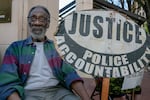
A man identifying himself as Mr. Barnett holds a sign supporting police accountability work during a memorial for Handelman. Barnett says Handelman was "a true believer in justice and peace. He actuated what he believed."
Anna Lueck for OPB
Michelle-Westley was also on this commission to shape the new board, where she first got to know Handelman. She said that, a woman of color who’s lived in low-income neighborhoods that have had negative interactions with the police, her lived experience paired well with Handelman’s in-depth knowledge of policies and laws.
“He would interpret the inner workings and I would interpret those blind spots that an older white guy wouldn’t recognize,” she said.
Handelman described himself as a feminist and anti-racist, and Michelle-Westley said he brought those values to the commission. While there were still “some things he needed to work on,” she said he listened and made space for others to lead.
Living a modest life
Handelman eschewed some of life’s material aspects in order to dedicate his time to causes. Matt Handelman described his brother as “totally immersed in his work.”
“He would literally take one day off a year — maybe two — on his birthday to go to a few movies,” Matt Handelman said. By the time he was hospitalized this month, he said, Dan was probably “resting for the first time in a long, long time.”
Matt Handelman said Dan chose to live on a shoestring budget: he didn’t own his home; he drove a modest car that he could repair. When his parents died, he donated much of his inheritance to organizations his parents supported.
“He lived off just enough to get by,” Matt Handelman said. “Modestly doesn’t even paint the right picture of how he chose to live his life.”
Dan’s background in set design helped him pick up work, both with theater companies and as a handyman, Matt said: “It was such a small focus of his life.”
While presenting himself as an unsentimental, fact-driven advocate in public, Handelman was different in private.
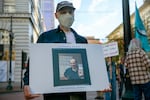
William Singer holds a photo of Dan Handelman during the memorial. Singer, who worked with Handelman for several decades, says, "there is no one who can possibly replace him."
Anna Lueck for OPB
“What I think people really didn’t know about Dan is how unbelievably personal all of this work was to him,” said LaVine. “They saw him really composed in front of the city council, but they didn’t see that oftentimes before and after city council, he was crying. He was just absolutely feeling the weight of everything he enmeshed himself in for the last 35 years.”
This weight appeared to wear on Handelman in recent years. Greene said he was becoming increasingly frustrated that, after decades of work, it felt like little had changed to improve police accountability in Portland.
“There were days that he went to seven meetings in a day and none of them were easy,” she said. “The subject matter wasn’t easy. Dealing with these other people wasn’t easy. It was all hard.”
Supporters at the Friday gathering said that, while Handelman’s work was incremental, it has led to the creation of strong, well-informed policies and new oversight tools that could have been easily watered down and ignored without a watchdog like Handelman keeping tabs.
Handelman leaves behind unfinished work. He was diligently focused on making sure the city’s new police oversight board was set up to be successful. That board is still months away from being operational, due to delays in selecting members and disagreements on city council about its structure.
Handelman also never saw the conclusion of the city’s settlement with the DOJ over police misconduct. Handelman provided testimony at nearly every court hearing related to the settlement until his death.
“We’re losing a community icon that was quietly there all the time supporting community members who were in pain,” said Hardesty. “His impact on everything having to do from police accountability will be felt for decades to come.”
Reminding others a better future is possible
Portland Copwatch wasn’t a one-man show. Handelman had a small group of equally passionate volunteers helping him, including Michelle-Westley. She and several other Copwatch members will try to fill the void he’s left behind.
“But it’s going to look different,” she said. “We know that it won’t be as intense, but we’re going to keep at it.”

A photo of Dan Handelman leans against a wall at Pioneer Courthouse Square, where Handelman held regular Friday rallies.
Anna Lueck for OPB
Handelman would have wanted someone to carry on his activism, his brother Matt said.
“One thing I always said about Dan is the world needs more Dans,” Matt Handelman said. “And that was before he died.”
Center for Equity and Inclusion advocate Matt LaVine said Handelman laid the groundwork to do just that. Part of what made Handelman effective at his job, LaVine said, was his ability to bring people together over a shared goal and show that dedication to that goal paid off.
“He gave us hope that we could be up against this unbelievably unjust system, but we can call for a better future,” he said.
That’s where Handelman’s absence may be felt the most, said LaVine.
“Who do we have now to remind us that a better future is possible?”